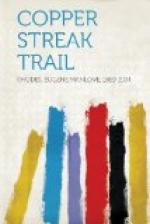So Pete Johnson’s thoughts were of millions; not without a queer feeling that he wouldn’t have the least idea what to do with them, and that he was parting with something in his past, priceless, vaguely indefinable: a sharing and acceptance of the common lot, a brotherhood with the not fortunate.
Riding to the northwest, Pete’s broad gray sombrero was tilted aside to shelter from the noonday sun a russet face, crinkled rather than wrinkled, and dusty. His hair, thinning at the temples, vigorous at the ears, was crisply white. A short and lately trimmed mustache held a smile in ambush; above it towered such a nose as Wellington loved.
It was broad at the base; deep creases ran from the corners of it, flanking the white mustache, to a mouth strong, full-lipped and undeniably large, ready alike for laughter or for sternness.
The nose—to follow the creases back again—was fleshy and beaked at the tip; it narrowed at the level bridge and broadened again where it joined the forehead, setting the eyes well apart. The eyes themselves were blue, just a little faded—for the man was sixty-two—and there were wind-puckers at the corners of them. But they were keen eyes, steady, sparkling and merry eyes, for all that; they were deep-set and long, and they sloped a trifle, high on the inside corners; pent in by pepper-and-salt brows, bushy, tufted and thick, roguishly aslant from the outer corners up to where they all but met above the Wellingtonian nose. A merry face, a forceful face: Pete was a little man, five feet seven, and rather slender than otherwise; but no one, in view of that face, ever thought of him as a small man or an old one.
The faint path merged with another and another, the angles of convergence giving the direction of the unknown water hole; they came at last to the main trail, a trunk line swollen by feeders from every ridge and arroyo. It bore away to the northeast, swerving, curving to pitch and climb in faultless following of the rule of roads—the greatest progress with the least exertion. Your cow is your best surveyor.
They came on the ranch suddenly, rounding a point into a small natural amphitheater. A flat-roofed dugout, fronted with stone, was built into the base of a boulder-piled hill; the door was open. Midnight perked his black head jauntily and slanted an ear.
High overhead, a thicket of hackberry and arrow-weed overhung the little valley. From this green tangle a pipe line on stilts broke away and straddled down a headlong hill. Frost was unknown; the pipe was supported by forked posts of height assorted to need, an expedient easier than ditching that iron hillside. The water discharged into a fenced and foursquare earthen reservoir; below it was a small corral of cedar stakes; through the open gate, as he rode by, Pete saw a long watering-trough with a float valve. Before the dugout stood a patriarchal juniper, in the shade of which two saddled horses stood droop-hipped, comfortably asleep. Waking, as Pete drew near, they adjusted their disarray in some confusion and eyed the newcomers with bright-eyed inquiry. Midnight, tripping by, hailed them with a civil little whinny.




